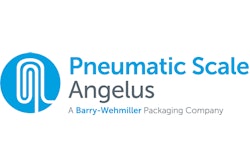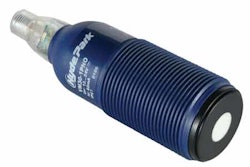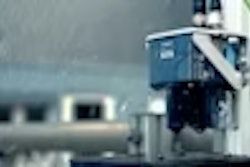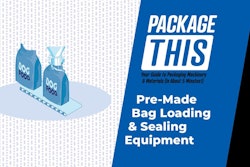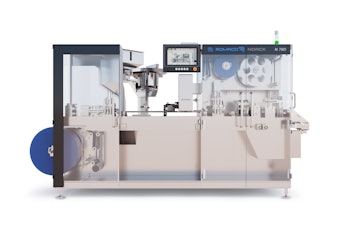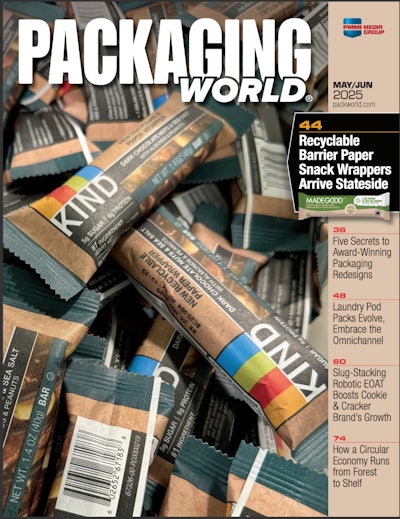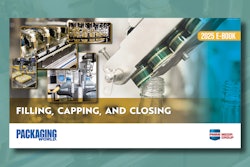Servo capping delivers quality through torque control and monitoring
So much has been reported on the flexibility and efficiency of servo-driven packaging machinery that it's easy to overlook the fundamental advantages servos can bring to quality. Consistency, tighter torque control and the feedback systems to monitor performance are inherent benefits of well-executed servo technology.
Pneumatic Scale has exploited all these servo capabilities in their SC Servo Capper, because they operate in industries where quality considerations are paramount -- namely health, beauty and personal care.
Pneumatic Scale was the first company in the U.S. to develop a rotary servo capper, using ELAU's groundbreaking rotary capping and labeling motion technology. The company had found existing servo impractical for installation on rotating turrets. Communications and control wiring were complicated, expensive and slow.
Purpose-built breakthrough for capping heads
But the ELAU PacDrive SCL-055 servo module is very different. Purpose-built for rotary cappers and labelers, it is a self-contained unit that eliminates the need for separate power amplifiers and electrical cabinets on the rotating turret. Wiring is simplified, with a minimum of slip rings and a single cable between each servo module and a turret-mounted power distribution box. There are no cables between the drive, motor and high resolution encoder because all three components are integrated in the servo module.
As Pneumatic Scale engineers explored this enabling technology, they discovered many advantages over traditional clutches for capping heads. First were in-process control using the servo's precise torque control, feedback and diagnostic capabilities. With capping torque accuracy to +/- 1 inch-lb. across a range from 5 to 100 in-lbs., the servos deliver lower standard deviations and improved Cpk values.
Chucks are stationary when picking caps, and the servos automatically accelerate to starting speed, decelerate to capping speed, deliver the required capping torque for the required interval, then decelerate to a stop.
Pneumatic Scale offers servo-driven infeed screws, starwheels and main turrets as well, all controlled by the same ELAU PacDrive automation controller as the capping heads.
In-process monitoring and corrective actions
Should the measured capping torque be incorrect for any cap applied, that container can be reliably detected and rejected, whether it is insufficient torque to generate a proper seal, overtorquing to indicate a cross-threaded cap, or a missing cap. The real-time in-process monitoring allows 100% verification of the application torque and provides statistical data for production management.
But, Pneumatic Scale's design team discovered, there are also fewer rejects and less rework, because a slipping or cross-threading situation can be detected while corrective action can be taken. Cap application torque remains consistent even during stops and starts. And, caps can be oriented.
And because all Pneumatic Scale cappers maintain positive control of containers, they prevent crushing, scuffing, slipping or spilling.
A cleaner capper, tool-less and stainless, too
The servo design makes for an inherently cleaner cGMP design as well, preventing potential quality issues. The designs are wash-down rated, the servo modules providing IP 67 rated protection and a Hart Coat® corrosion-resistant finish. A choice of simple friction chucks or mechanically actuated chucks resist contaminant buildup.
All the mechanical functions of the machine are controlled from the base, with the main machine cam below the deck plate.
Perhaps most important, three lubrication points per spindle in the upper turret are eliminated. This also simplifies maintenance, along with elimination of mechanical adjustment to change torques. The servos use sealed bearings and the controller supports tool-less, recipe-driven changeovers by the operator.
Along with these servo benefits, Pneumatic Scale has built quality into all other aspects of construction. Pharmaceutical raised wearstrip conveyor is used for infeed and outfeed sections. The stainless steel upper frame uses stainless, framed Lexan® doors with electrical interlocks. The frame doubles as a wireway. The servo modules are easily accessed in the upper turret.
Full stainless construction is available, with lower panels of 1/4” thick stainless steel and removable stainless access panels with optional Lexan inserts. Or, a welded steel frame combines a corrosion and chip resistant paint finish with a one inch thick steel top plate clad in stainless steel.
Either way, the SC Capper is a low profile (90” height) machine that requires just a 4 _ foot square footprint for 450mm pitch units from 2 to 10 capping heads.
For more information, contact Pneumatic Scale Corporation a Barry-Wehmiller Company. Visit www.pneumaticscale.com or email [email protected].
About ELAU
ELAU, a company of Schneider Electric, equips over $1 billion worth of the world's best machines annually, with over 30,000 PacDrive systems already deployed in packaging machinery worldwide. PacDrive is the first truly integrated automation architecture, capable of performing the functions of PLC, motion control, robotics, temperature control, PLS, MES data interface and more in a single, standards-based software environment.
For more information, visit www.elau.com or email [email protected].
So much has been reported on the flexibility and efficiency of servo-driven packaging machinery that it's easy to overlook the fundamental advantages servos can bring to quality. Consistency, tighter torque control and the feedback systems to monitor performance are inherent benefits of well-executed servo technology.
Pneumatic Scale has exploited all these servo capabilities in their SC Servo Capper, because they operate in industries where quality considerations are paramount -- namely health, beauty and personal care.
Pneumatic Scale was the first company in the U.S. to develop a rotary servo capper, using ELAU's groundbreaking rotary capping and labeling motion technology. The company had found existing servo impractical for installation on rotating turrets. Communications and control wiring were complicated, expensive and slow.
Purpose-built breakthrough for capping heads
But the ELAU PacDrive SCL-055 servo module is very different. Purpose-built for rotary cappers and labelers, it is a self-contained unit that eliminates the need for separate power amplifiers and electrical cabinets on the rotating turret. Wiring is simplified, with a minimum of slip rings and a single cable between each servo module and a turret-mounted power distribution box. There are no cables between the drive, motor and high resolution encoder because all three components are integrated in the servo module.
As Pneumatic Scale engineers explored this enabling technology, they discovered many advantages over traditional clutches for capping heads. First were in-process control using the servo's precise torque control, feedback and diagnostic capabilities. With capping torque accuracy to +/- 1 inch-lb. across a range from 5 to 100 in-lbs., the servos deliver lower standard deviations and improved Cpk values.
Chucks are stationary when picking caps, and the servos automatically accelerate to starting speed, decelerate to capping speed, deliver the required capping torque for the required interval, then decelerate to a stop.
Pneumatic Scale offers servo-driven infeed screws, starwheels and main turrets as well, all controlled by the same ELAU PacDrive automation controller as the capping heads.
In-process monitoring and corrective actions
Should the measured capping torque be incorrect for any cap applied, that container can be reliably detected and rejected, whether it is insufficient torque to generate a proper seal, overtorquing to indicate a cross-threaded cap, or a missing cap. The real-time in-process monitoring allows 100% verification of the application torque and provides statistical data for production management.
But, Pneumatic Scale's design team discovered, there are also fewer rejects and less rework, because a slipping or cross-threading situation can be detected while corrective action can be taken. Cap application torque remains consistent even during stops and starts. And, caps can be oriented.
And because all Pneumatic Scale cappers maintain positive control of containers, they prevent crushing, scuffing, slipping or spilling.
A cleaner capper, tool-less and stainless, too
The servo design makes for an inherently cleaner cGMP design as well, preventing potential quality issues. The designs are wash-down rated, the servo modules providing IP 67 rated protection and a Hart Coat® corrosion-resistant finish. A choice of simple friction chucks or mechanically actuated chucks resist contaminant buildup.
All the mechanical functions of the machine are controlled from the base, with the main machine cam below the deck plate.
Perhaps most important, three lubrication points per spindle in the upper turret are eliminated. This also simplifies maintenance, along with elimination of mechanical adjustment to change torques. The servos use sealed bearings and the controller supports tool-less, recipe-driven changeovers by the operator.
Along with these servo benefits, Pneumatic Scale has built quality into all other aspects of construction. Pharmaceutical raised wearstrip conveyor is used for infeed and outfeed sections. The stainless steel upper frame uses stainless, framed Lexan® doors with electrical interlocks. The frame doubles as a wireway. The servo modules are easily accessed in the upper turret.
Full stainless construction is available, with lower panels of 1/4” thick stainless steel and removable stainless access panels with optional Lexan inserts. Or, a welded steel frame combines a corrosion and chip resistant paint finish with a one inch thick steel top plate clad in stainless steel.
Either way, the SC Capper is a low profile (90” height) machine that requires just a 4 _ foot square footprint for 450mm pitch units from 2 to 10 capping heads.
For more information, contact Pneumatic Scale Corporation a Barry-Wehmiller Company. Visit www.pneumaticscale.com or email [email protected].
About ELAU
ELAU, a company of Schneider Electric, equips over $1 billion worth of the world's best machines annually, with over 30,000 PacDrive systems already deployed in packaging machinery worldwide. PacDrive is the first truly integrated automation architecture, capable of performing the functions of PLC, motion control, robotics, temperature control, PLS, MES data interface and more in a single, standards-based software environment.
For more information, visit www.elau.com or email [email protected].
Companies in this video




